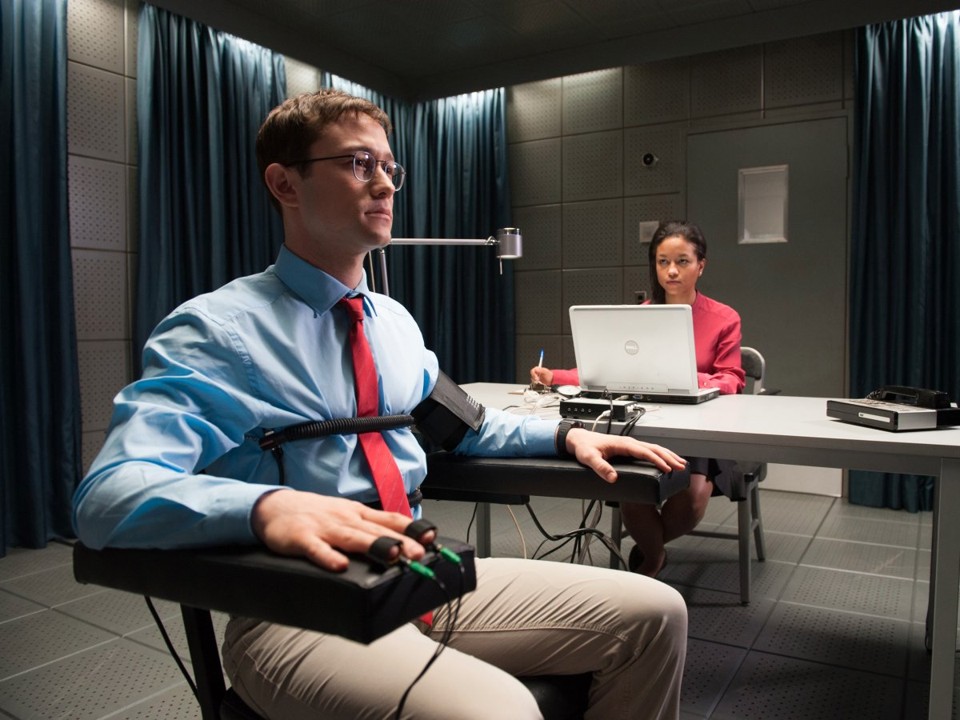SEPTEMBER 21, 2016
If you have been fortunate enough to see Laura Poitras’ Academy-Award winning documentary “Citizenfour” about the days just before and after Edward Snowden revealed the illegal wiretapping practices of the National Security Agency (NSA), there’s probably no need to see Oliver Stone’s fictionalized version of that story in “Snowden.” But if you haven’t (and I order you to Netflix “Citizenfour” now!), Oliver Stone’s film may serve as a valuable course in Snowden 101.
What Poitras’ brilliant documentary did was to document the hours just before the revelations of the information that Snowden disclosed and the awareness that Snowden had that he would be, within minutes, a worldwide celebrity and soon an international pariah.
Stone’s version of the story, “Snowden,” evokes none of that apprehension, despite stellar work from his starry cast. The frame of Stone’s film is the filming of Poitras’ documentary with Snowden (Joseph Gordon-Levitt) in a Hong Kong hotel room, having contacted Poitras (Melissa Leo) as well as investigative journalist Glenn Greenwald (Zachary Quinto) and intelligence reporter from the UK paper The Guardian Ewan MacAskill (Tom Wilkinson with an actually intelligible Scottish accent!). The four are agonizing how they’re going to release this information (as it was in “Citizenfour”), and it’s the best part of the movie.
But it’s a biopic, and biopic rules must be obeyed, We flash back to see Snowden applying for work in the CIA, because he says it’s cool to have access to “classified stuff.” He bounces around from Washington to Vienna to China to Japan and finally to Hawaii where the research he has seen about how many ordinary Americans are under government surveillance outrages him, and he decides to go public with the files to which he has access.
The victim (willing or not) is his girlfriend Lindsay Mille (Shailene Woodley) who is frustrated with his secrecy but ultimately guides Snowden to the good life. Woodley has the most difficult role in the film, being the supportive girlfriend while still scoping out what’s going on with her lover’s life. It’s a tricky tightrope that she manages to overcome beautifully.
For me, at least, the problem with “Snowden” is that Stone seems determined to rile up the audience into outrage that millions of Americans are having their phone calls, Facebook postings and Instagram photos monitored. He has a point — it’s creepy and it’s scary that our activities on social media may be monitored — but it is a reality that was made clear several years ago, and as uncomfortable as Americans might be with that fact, we’ve seemed to have accepted it and moved on. Stone may be “Shocked! Shocked!” that such things are happening, but for the rest of us, it’s just another day.
This is to take nothing away from the strengths of the film. Despite his occasional hysterics, Stone knows how to make a movie, and “Snowden” is mostly devoid of hysteria. It’s a thoughtful and (for the most part) non-polemic film. He even gets a serious performance out of Nicolas Cage, another artist who has been known to go off the rails. (The prescription bill for mood stabilizers on this shoot must have been staggering.)
Gordon-Levitt really captures Snowden’s low-key demeanor, which is brought home when Gordon-Levitt morphs into the real Edward Snowden in the film’s conclusion. (I guess that was a spoiler. Sorry.) Leo is also uncharacteristically understated, leaving the flashier moments to Quinto and Wilkinson in the hotel room.
“Snowden” is not a bad film, but it’s not particularly a good one either. It’s a bit dry at times and there’s a lack of momentum in moving the narrative. But unlike “Sully,” the another real-life story in the marketplace now, “Snowden” tells us little (of importance) that we don’t already know, and although Stone has undeniable directorial chops, even his skills can’t get us to care about a story that seems two years too late to the party.
GRADE: C+












